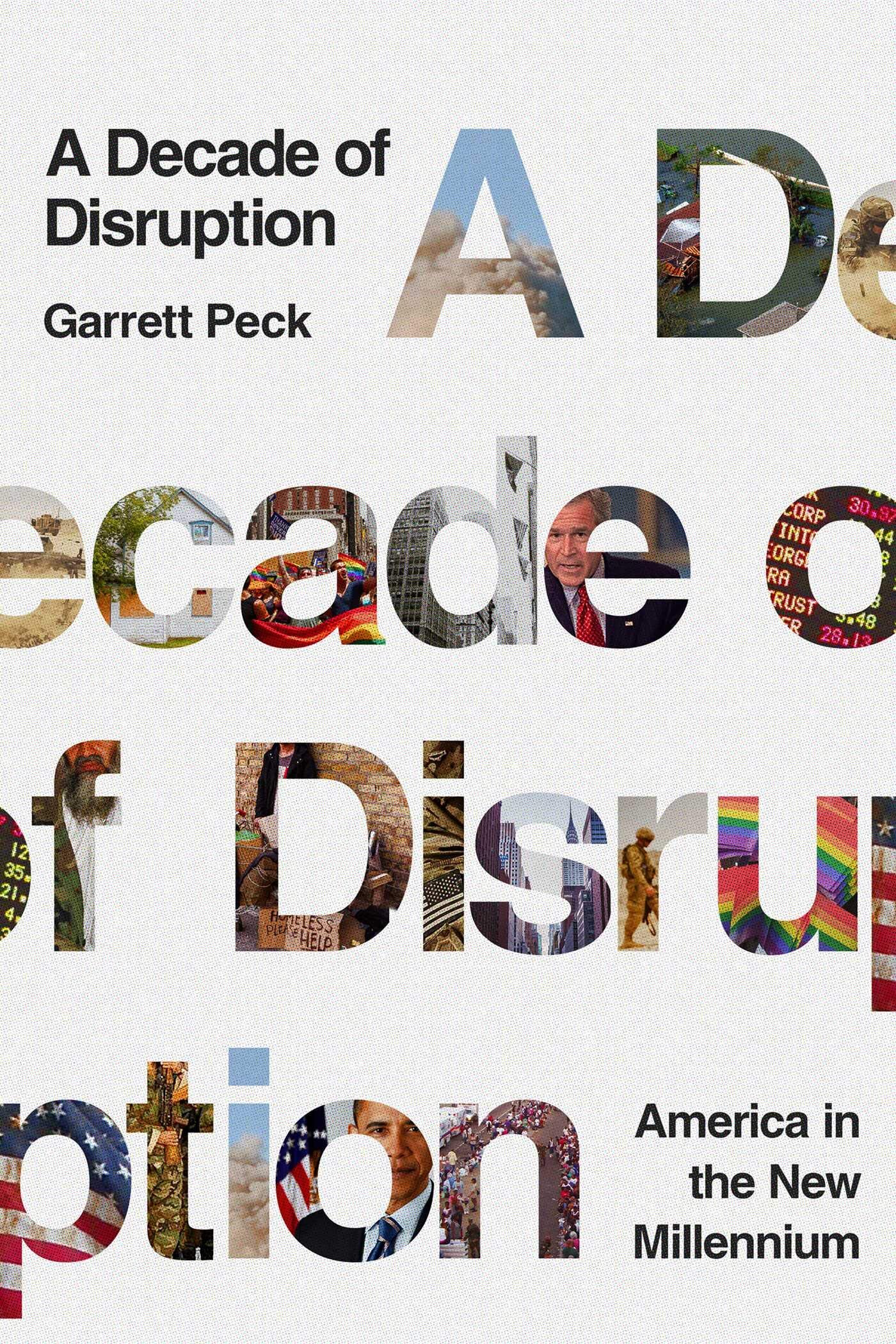A Decade of Disruption: An Interview with Garrett Peck
The start of the new millennium brought great hope, excitement, and fear over Y2K. Those who celebrated on New Year’s Eve 1999 had no idea what the coming decade held in store. The 2000s would prove to be an especially disruptive era.
Garrett Peck provides a look back at the 2000s in his new book, A Decade of Disruption: America in the New Millennium. Originally from California and a graduate of VMI & GWU, Peck (an army veteran) is author of multiple books, and works as a public historian & tour guide. He currently lives in Arlington, VA.
Peck’s new book A Decade of Disruption published in June 2020
Peck’s new title focuses on the major events of the 2000s. It begins with Y2K, transitions to the Dot-com meltdown, and continues onto other decade defining events such as 9/11, Hurricane Katrina, the Great Recession, and the election of Barack Obama. I recently had the opportunity to read Peck’s book and interview him personally. We looked back over the decade I grew up in, spoke about the present moment and peered into the future.
Being born in the early 2000s, reading A Decade of Disruption made me realize that despite my knowledge of the era, I don’t actually remember most of it. Instead, I grew up with the influence of these events around me and today have some knowledge of their continuing impact. As a result, reading Garrett’s book was eye-opening.
At the beginning of the decade, the Dot-com meltdown of 2000 shook the public. It was followed by the era’s greatest disruption - September 11, 2001. I couldn’t help but wonder if these cataclysms caused the 2000s to start on bad footing, or if other historical factors would come to define the 2000s as the decade that never caught a break. Peck’s answer - a little bit of both. “No one at the millennium was prepared for the Dot-com meltdown. People felt that the Cold War is over, history is over.” People were optimistic about the state of the world, which left them blind to the shakeups that lay ahead in the decade’s early years. Consequently, these same people would see the housing bubble burst in 2007. Peck draws parallels between Americans of the 2000s and those of the Calvin Coolidge years - when hope and excitement surrounding the roaring 1920s was fated to crumble with the stock market crash of 1929.
The first Apple iPhone, released in June 2007
Our conversation then pivoted to the innovations of the 2000s and how they continue to impact us today. The internet exploded with social media sites such as Twitter and Facebook (begun in 2005 and 2006 respectively) the first iPhone was released in 2007, and the iPad was born in 2010. During this time, the people of the world moved toward constant connectivity - with phones and internet access always at hand. A Decade of Disruption analyzes this phenomenon in a chapter cleverly entitled, “National Pass Time”. What would the culture of connectivity mean for children? Peck’s answer surprises, “The kids were alright, remarkably well adjusted. We as a culture weren’t dumbing down, but actually getting smarter.” Is there a connection here to our current world of working virtually and students attending school online? I asked Peck his thoughts on today’s kids. Would they be “remarkably well adjusted” once again after the period of remote schooling ends? His answer echoed the fears of many parents, “There will be mental health and childhood development impacts from the coronavirus. So many people realize the importance of sending their kids to school. They’re not just there to learn. They’re there to socialize too.” Younger kids are missing out on learning simple life skills while other students are missing out on their proms, graduations, college tours, and being around friends. There is no doubt that the coronavirus will result in intense setbacks for people of all ages and yet, we face the change and disruption with the hope of a brighter tomorrow like every other disruption we have faced before.
The decade we just finished - the 2010s - left us with its own unanticipated disruptions. No one could have been prepared for a pandemic which would impact the entire world. When asked about the current crisis , Peck observed, “there are disruptions throughout history,” and that “we are more aware of the disruptions through the media.” There’s truth in this. Whether it’s on the global level (a pandemic), the national level, (a presidential election), or on a personal level (moving away from home). Disruption is everywhere, and it’s also necessary for human growth. It shapes our collective and individual futures.
A sign of encouragement at The Anthem, a music venue on the wharf in southwest Washington D.C
We are in the beginning of a new decade where anything could happen. At the end of Peck’s book he writes, “We must have faith in the American Democracy that we will eventually get it right. History is not over.” To this end, I asked Garrett what his hopes for the American Democracy and the 2020s were. His responses reflected hope for the American party system. “We need two functioning and working parties.” He also reflected on the current populist moment. “Populism comes from the eroding standard of life of the working class,” he says, noting that we have to listen to the complaints and issues of the working class to better our society. “Not everyone needs to go to college and unfortunately, we’ve painted it as the holy grail. We need to give people the skills to thrive in the modern economy. Everyone needs an education.” He recognized that this hope is aspirational, but also that American Democracy is strong enough to get it right.
Ultimately, we are living through history. One hundred years from now, people will talk about this American moment. There will always be disruptions in our world and we must remain resilient, looking toward a brighter tomorrow. Garrett Peck’s book helps us to better understand these currents and if we can understand them, perhaps we can weather them more effectively and (when possible) be at peace amidst them.
A Decade of Disruption, is now available for purchase on Bookshop (support independent booksellers!) and also on Amazon.
Learn more about Garrett Peck and his work:
To learn more about his tours, to view his other interviews, and more: Please check out his website
You may also view the other books Garrett Peck has written on Bookshop as well as his Amazon Author Page!



